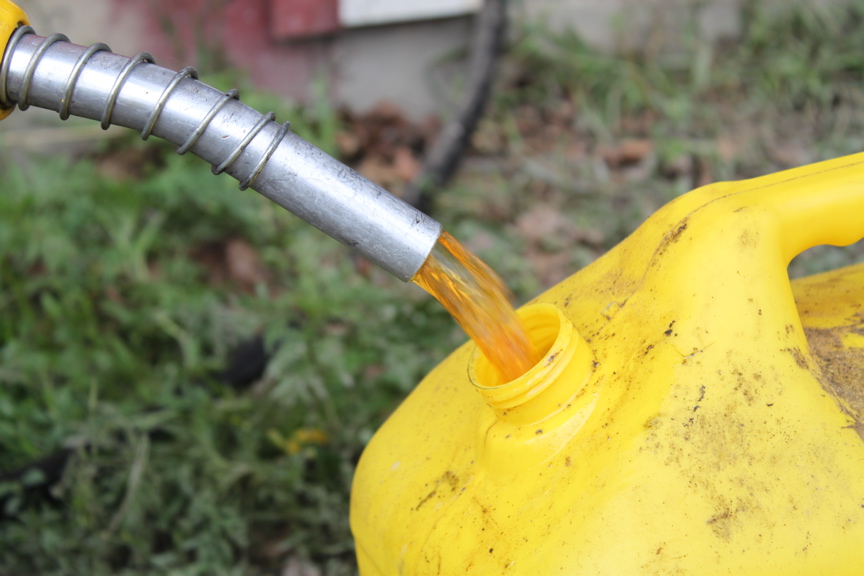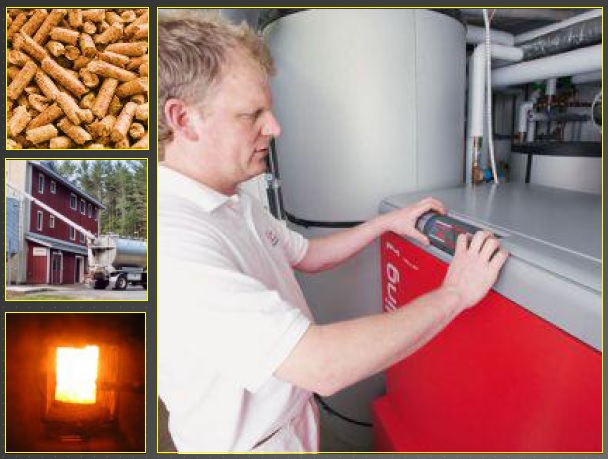21 Mar 2014
Local Production for Local Use: A Case Study
Prepared by Sarah Galbraith, Vermont Bioenergy Initiative Program Manager, VSJF
Highlights: Cost of biodiesel production = $2.29 per gallon ● Seed meal used as a co-product for livestock feed or crop fertilizer ● Central processing facility and shared equipment use maximizes efficiency for neighboring farms
Roger Rainville’s dairy-turned-energy farm in Grand Isle County is a place where area dairy farmers, organic growers, and landowners have made biodiesel from their own locally-grown sunflower seeds.
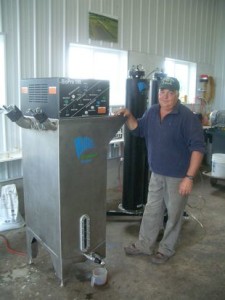
Roger Rainville with BioPro 190 automated biodiesel processor at Borderview Farm. Photo: Vermont Bioenergy Initiative
In 2008, when diesel prices rose from $4 to $5 per gallon, Rainville began experimenting with farm-scale biodiesel production. With guidance from University of Vermont (UVM) Extension and grant funding from Vermont Sustainable Jobs Fund’s Vermont Bioenergy Initiative, Rainville began planting sunflowers on a portion of his 214 acres and installing biodiesel processing equipment. Oilseed sunflowers (as opposed to confectionary sunflowers that are grown for eating) are the most popular oilseed crop in Vermont, with hundreds of acres planted statewide. The crop is grown in rotation with grains and grasses and yields high quantities of oil.
Harvesting, Cleaning, and Pressing
Following harvest with a combine, a seed cleaner and grain dryer are used to prepare the seeds for storage in a 200-ton grain bin prior to processing. A flex auger system moves the seeds from the storage bin into hoppers on each press, and screw augers push the seed through a narrow dye at the front of the press. Extracted oil oozes from the side of the barrel and is collected in settling tanks while pelletized meal is pushed through the dye at the front and is stored in one-ton agricultural sacks. The oil can then be used as culinary oil for cooking or further refined into biodiesel. The leftover seed meal is used for livestock feed, fuel for pellet stoves, or fertilizer for crops.
Biodiesel Processing
The small-scale biodiesel production facility at Borderview Farm is an 800 square foot insulated and heated building (the space does not need to be heated, but the oil should be stored where it will not freeze) that houses an oil press, a BioPro 190 automated biodiesel processor, a methanol recovery system, and a set of dry-wash columns for cleaning the fuel. The clean oil at the top of each settling tank is added to the BioPro 190 processor along with lye, methanol, and sulfuric acid. The automated processor runs through several stages of processing in about 48 hours (esterification, transesterification, settling, washing, and drying), with one break after 24 hours to remove the glycerin byproduct. Safety equipment in the processing facility includes personal protective equipment like aprons, gloves, eye protection, a ventilation system, gas detectors, and spill containment materials. At Borderview Farm a set of standard operating procedures hangs on the wall and blank check-sheets are in a binder to make the process easy to repeat. The finished biodiesel is stored in 250 gallon pallet tanks making distribution to different farms easier. The installed capacity of the facility can process 100 tons of seeds from 138 acres of sunflowers per year, yielding 10,500 gallons of biodiesel and 64 tons of sunflower meal (assuming the state average yield of 1,500 pounds sunflower seeds per acre and operation of 24 hours per day for 260 days per year).
Rainville switched from purchasing diesel for five tractors and one truck to making his own biodiesel. He wanted to be independent of imported fuel, and liked creating a new way for farmers to diversify. “Using land for making biodiesel is not the most economical option compared to some other crops, but it’s about creating opportunities to try something different,” says Rainville.
Sharing Infrastructure Through the Farm Fresh Fuel Project
In 2012 a group of ten farmers working in cooperation with Rainville and UVM Extension—called the Farm Fresh Fuel project—grew 90 acres of sunflowers for development of biodiesel. Cooperating farmers were required to plant, fertilize, weed, and harvest the sunflower crop. Farmers worked to share equipment to accomplish this task. The seed was brought to Rainville for conversion into biodiesel. Rainville did the harvesting for all farms, bringing about 56,721 pounds of seed to Borderview Farm.
Seeds from the ten growers yielded about 3,000 gallons of biodiesel and about 20 tons of meal for livestock feed. The biodiesel and meal were then redistributed to the growers based on the relative volume of sunflower seeds they contributed. One participating dairy farm, Sunset Lake Farms, is using the biodiesel to heat office space, the milking parlor, and water for cleaning and sanitizing equipment, and fed the meal to milking cows at a rate of 3 pounds per day, saving about $3,000 on fuel and feed costs.
Rainville’s annual biodiesel use has ranged from 500 to 3,000 gallons per year. At current prices (over $4 per gallon for diesel and $2.29 per produced gallon of biodiesel) biodiesel has saved him from $500 to $4,000 per year in fuel costs. He also emphasizes energy independence as an added benefit. Plus, any growers that also raise livestock can use the meal, which is leftover after the oil is extracted, as part of their feed rations. Rainville recommends talking with an animal nutritionist to blend this into feed at the right ratio, since sunflower meal has a high fat content.
When asked what advice Rainville would give others who want to make their own biodiesel, he says, “Ask questions, ask questions, ask questions. And ask them again!”
Learn more about energy efficiency and renewable energy in the Energy section of the Vermont Food System Atlas.
13 Mar 2014
Pellet Boiler Workshop Breaks Down the Basics
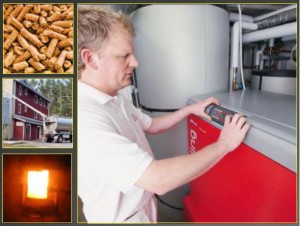 The Biomass Energy Resource Center at VEIC, in partnership with Renewable Energy Vermont, Housing Vermont, and the Vermont Fuel Efficiency Partnership are hitting the road in Vermont to share the basics of wood pellet boiler heating systems.
The Biomass Energy Resource Center at VEIC, in partnership with Renewable Energy Vermont, Housing Vermont, and the Vermont Fuel Efficiency Partnership are hitting the road in Vermont to share the basics of wood pellet boiler heating systems.
The BERC team and partners will continue their road show on Friday, March 14th, 2014 from 9am to noon at the Windsor Village Apartments in Windsor, VT. For more information, or to register, please email BERC.
Highlighted topics will include:
- An overview of biomass heat
- Perspectives from housing developers on biomass heating and its applications in multifamily buildings
- Opportunities to optimize the design process and select appropriate biomass systems
- An overview of pellet boiler systems
- Integrating pellet systems ,solar hot water, and fossil fuels
- An overview of the manufacture and distribution of wood pellets
11 Mar 2014
Waterbury LEAP Energy Fair
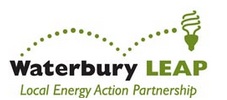 Saturday, April 5, 2014 | From 9am to 3pm | Free Admission
Saturday, April 5, 2014 | From 9am to 3pm | Free Admission
Crossett Brook Middle School Gym, Duxbury
Including the Waterbury Farmers’ Market
Learn how to reduce fuel bills, save energy, and reduce emissions by visiting over 70 exhibitors, participating in break-out discussions, and taking part in walk-through weatherization and energy demonstration projects. Go here for an overview of the event and list of exhibitors.
10 Mar 2014
Montpelier Announces a Renewable Energy Future

A new initiative is focused on making Montpelier, Vermont the first net-zero capital city in the country.
City officials today joined with energy leaders to launch a major initiative focused on making Montpelier the first net zero capital city in the country. Achieving net zero means that Montpelier would meet all its power needs through renewable energy sources and efficiency by 2030. The City of Montpelier was joined by a coalition of organizations that are committed to making this goal a reality.
“This ambitious goal, endorsed by the city council, sets a new direction for Montpelier’s energy future that will provide the opportunity for every citizen to engage,” said Montpelier Mayor John Hollar.
Montpelier is uniquely positioned to move forward on the net zero by 2030 goal. More than 15% of Montpelier housing units have already completed comprehensive energy efficiency projects with Efficiency Vermont; in 2013, the city upgraded all streetlights to high efficiency LEDs; and the downtown biomass district heating project is currently nearing completion.
The Energy Action Network and Montpelier Energy Advisory Committee have worked closely with the city to set the net zero goal and bring together the group of stakeholders to map out a plan of action. “Montpelier’s commitment to creating a secure and affordable energy future is tremendously exciting,” said Andrea Colnes, executive director of the Energy Action Network. “Through this project Montpelier and Vermont will again lead by example and inspire other cities across the US to reach for a bright future and shift to clean, renewable energy.”
Dan Jones, Chair of the Montpelier Energy Advisory Committee, describes this project as “a unique approach for a city as a whole. By engaging the city government, businesses, and citizens around a common vision, we hope to change the conversation from piecemeal small reforms to a system-wide reimagining of our energy priorities. This project will require the collaboration of all Montpelier’s sectors to make it a reality.”
As part of today’s launch, Green Mountain Power and Efficiency Vermont announced a suite of initiatives designed to support the effort by driving down energy consumption and increasing the use of renewable energy in Montpelier. These include:
Green Mountain Power will work with the city to locate multiple electric vehicle charging stations in the City;
- Efficiency Vermont will convene a “Net Zero Montpelier” community conversation in September to help residents, businesses, and local partners set goals and take action on energy efficiency. Reducing energy consumption is a key first step towards net zero, since it enables a larger portion of energy needs to be met through renewable sources;
- Efficiency Vermont experts will offer guidance, incentives, and support to help homeowners reduce their energy usage and make their homes “net zero ready;”
- Green Mountain Power will extend to Montpelier its pilot heat pump program that saves customers money while reducing fossil fuel use for heating;
- Efficiency Vermont and the City of Montpelier will develop an energy road map for all municipal facilities, including exploring the opportunity to design the new downtown transit center to net zero standards, and kicking off a large scale energy saving project at the wastewater treatment facility;
- The Vermont Department of Buildings and General Services will collaborate with Efficiency Vermont on a large scale effort to reduce energy usage in Montpelier’s state buildings;
- GMP will work with AllEarth Renewables to install solar trackers in a group net metering project involving the Vermont Natural Resources Council and Vermont Land Trust, who have expressed interest in taking the power. The trackers will be on GMP property near the entrance of the city and will be a visual statement of Montpelier’s commitment to becoming net zero.
“This initiative signals a transformation in how Vermont’s cities and towns will use energy,” said Mary Powell, president and chief executive officer of Green Mountain Power. “Deploying new technologies in our cities and towns, as we are also doing in Rutland, will have economic and environmental benefits for all Vermonters. It makes perfect sense that Vermont would be the state where we can successfully make our capital net zero.”
“We are looking forward to helping turn the vision of Net Zero Montpelier into a reality,” said Jim Merriam, Director of Efficiency Vermont. “In driving progress toward the net zero goal, Efficiency Vermont experts will engage with partners and community members at every level to help them get the most value for their energy dollars, and set the stage for a clean energy future.”
Other partners in Net Zero Montpelier have so far included: Vermont State Employees Credit Union, National Life, Vermont Energy Investment Corporation, SunCommon, IBM and the general membership of the Energy Action Network. As Net Zero Montpelier continues to engage the community, there will be numerous opportunities for additional organizations and stakeholders become actively involved in the effort.
For more information on Net Zero Montpelier, or to get involved, please visit www.eanvt.org/net-zero-montpelier. To learn more about GMP’s heat pump pilot project, email heatpump@greenmountainpower.com.
Press Contact:
Jessie Baker
Assistant City Manager
City of Montpelier
39 Main Street
Montpelier, VT 05602
(802) 262-6250




